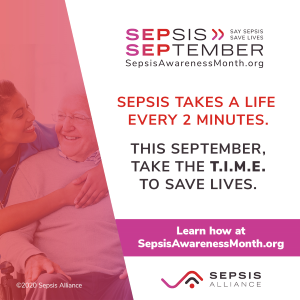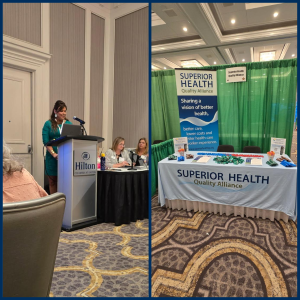Quality Advisor
QUALITY EVENTS
Nov. 17, 2025
Wisconsin Rural Health and Substance Use Clinical Support (RHeSUS) Lunch and Learn SeriesNov. 19, 2025
Caring for Wisconsin’s Caregivers: Advancing Health Workforce Well-BeingDec. 15, 2025
Wisconsin Rural Health and Substance Use Clinical Support (RHeSUS) Lunch and Learn SeriesClick here to view quality event calendar
QUALITY IMPROVEMENT TEAM
Nadine Allen
Chief Quality OfficerMarcia Egle
Administrative AssistantKelli Evenson
Administrative AssistantStacy Kopp
Clinical Quality Improvement ManagerJill Lindwall
Clinical Quality Improvement ManagerJenny Pritchett
Clinical Quality Improvement ManagerCasey Zimpel
Clinical Quality Improvement ManagerSubscribe to The Quality Advisor
News from the CQO's Desk
(reduced).jpg) September is Sepsis Awareness Month
September is Sepsis Awareness Month
Sepsis is a life-threatening condition that occurs when the body's immune system overreacts to an infection and is a medical emergency. Symptoms must be treated rapidly to reduce the risk of death.
In honor of Sepsis Awareness Month, SepsisAlliance is encouraging everyone to learn the signs of sepsis. Take the time to learn the signs.
You can find Sepsis-related resources on the WHA Quality Healthcare-Associated Infections page.
Wisconsin Hospitals Among Nation’s Best in Qualityth highest for top ; +
Sixth highest for top CMS Star Ratings; highest among states with 50+ hospitals
Wisconsin hospitals once again earned national recognition for health care quality, ranking well above the national average in recently released Overall Hospital Quality Star Ratings from the Centers for Medicare & Medicaid Services (CMS). The ratings, based on 45 measures across five categories including safety of care, patient experience, timely and effective care, mortality and readmissions – placed Wisconsin’s hospitals sixth in the nation for the percentage of hospitals earning four or five stars.
According to CMS, 65% of Wisconsin hospitals received four- or five-star ratings, compared to the national average of 36%. This is the sixth-highest overall percentage of four and five-star-rated hospitals in any state and the highest percentage for states with 50 or more hospitals.
“These results reflect a statewide commitment to excellence that benefits every patient, in every community,” said Wisconsin Hospital Association (WHA) President and CEO Kyle O’Brien. “Wisconsin’s hospitals have a longstanding track record of high-quality healthcare that consistently delivers some of the best outcomes in the nation. As a critical community need, high-quality health care is important for all types of employers seeking to attract and retain talent in Wisconsin.”
The strong CMS results are the latest recognition Wisconsin hospitals have received in 2025 for quality and patient satisfaction. Wisconsin ranked first among peer states with 100 or more hospitals for patient recommendations, was named a top 10 state for health care by WalletHub and saw its critical access hospitals recognized among the top 10 nationally for quality reporting and performance by the Health Resources and Services Administration (HRSA) as a part of the Medicare Beneficiary Quality Improvement Project (MBQIP). These achievements reflect Wisconsin hospitals’ ongoing commitment to delivering high-quality, patient-centered care in our communities.
“High quality isn’t just a measure – it’s an experience patients can see, feel and trust,” said WHA Chief Quality Officer Nadine Allen. “These ratings are a direct result of the dedication, skill and compassion that hospital teams bring to their work every single day.”
For more than 20 years, WHA’s CheckPoint tool has led the nation for its statewide, voluntary hospital quality reporting program. CheckPoint allows hospitals, patients and employers to benchmark performance and compare results, driving ongoing improvements in patient care across Wisconsin.
2.png) Caring for Wisconsin’s Caregivers Initiative Kicks Off
Caring for Wisconsin’s Caregivers Initiative Kicks Off
The Wisconsin Hospital Association (WHA), in partnership with Advancing a Healthier Wisconsin (AHW) through the Health Workforce Well-Being Landmark Initiative, and the Dr. Lorna Breen Heroes’ Foundation is leading a five-year, statewide effort to strengthen health workforce well-being. The Caring for Wisconsin’s Caregivers Initiative will support hospitals, health systems and health workforce leaders by convening experts to share best practices, tools and resources that enhance internal well-being programs, while also advancing collective statewide priorities.
This nearly $3 million investment will fund sustainable, evidence-based solutions tailored to Wisconsin’s unique needs. The Steering Committee, comprising more than 20 representatives from hospitals and health systems, health associations, workforce well-being champions and state leaders, recently held its kickoff meeting at the Medical College of Wisconsin’s HUB for Collaborative Medicine, donning Milwaukee Brewers attire to celebrate the focus on Wisconsin strategies. Together, this committee will guide efforts to help reduce burnout, improve retention and recruitment, enhance leadership development and promote systemic changes such as credentialing and licensing updates.
This initiative builds on successful national models—such as the Dr. Lorna Breen Wellbeing First Champion Challenge—by encouraging licensure boards, hospitals and health systems to standardize applications, forms and addendums, while also addressing Wisconsin-specific opportunities. The focus is on systemic change that is meaningful and lasting—reducing burnout, improving job satisfaction, enhancing retention and recruitment and destigmatizing seeking mental health support.
With more than 230,000 health professionals caring for Wisconsin communities, the initiative’s goal is to make Wisconsin the best place to work in healthcare. WHA invites organizations to connect and stay engaged in this important work—because when health workers thrive, Wisconsin thrives.
For more details, refer to the full press release. Contact Nadine Allen with questions.
.png) L to R: Janet Wagner, RWHC, Jenny Pritchett, WHA, Davis Balestracci, Harmony Consulting, Samantha Peck, WORHHealthcare Quality Data Sanity Workshop Held August 26
L to R: Janet Wagner, RWHC, Jenny Pritchett, WHA, Davis Balestracci, Harmony Consulting, Samantha Peck, WORHHealthcare Quality Data Sanity Workshop Held August 26
On August 26, the Healthcare Quality Data Sanity Workshop was held at Glacier Canyon in Wisconsin Dells. Sponsored by the Wisconsin Office of Rural Health (WORH) and hosted by the Wisconsin Hospital Association (WHA) and Rural Wisconsin Health Cooperative (RWHC), the one-day event brought together participants from rural hospitals across the state.
Led by Davis Balestracci, M.S. in Statistics—an internationally recognized speaker known for his engaging and insightful approach—the workshop focused on practical strategies for analyzing healthcare data to drive quality improvement. Attendees enhanced their skills in creating various analytic tools, such as run charts and control charts, data interpretation, report utilization and identifying performance improvement opportunities. The session emphasized applying appropriate methods to projects and datasets applicable to multiple healthcare settings.
The workshop offered a dynamic and interactive learning experience, equipping participants with actionable tools to support data-driven decision-making in healthcare quality initiatives.
Age-Friendly Health Systems Online Course with Coaching
The Institute for Healthcare Improvement (IHI) is offering interested organizations an opportunity to join the Age-Friendly Health Systems movement.
The Age-Friendly Health Systems Online Course with Coaching is an in-depth program that teaches the elements of the 4Ms Framework and develops an organization’s ability to provide age-friendly care in various settings, including hospitals, ambulatory clinics, nursing homes and home health agencies. The program will help teams of attendees get started with age-friendly care and learn to act as age-friendly champions within their health system.
To learn more or to register for the course, click here.
2025 Hospital Quality Needs Assessment
As the WHA Quality team works to provide programs and services that best meet your needs, we would first like your feedback to this short, four-question survey. The information you share in this Hospital Quality Needs Assessment survey will help guide us as we design future initiatives and offerings. We appreciate your feedback!
AHRQ Offers Safety Program for Catheter-Associated Urinary Tract Infection Prevention
The AHRQ Safety Program for Healthcare Associated Infection (HAI) Prevention, led by National Opinion Research Center (NORC) at the University of Chicago and Johns Hopkins University, is recruiting for a new cohort, the Catheter-Associated Urinary Tract Infection (CAUTI) cohort. This program is a multi-year effort where they will work with hospitals across the country to reduce HAI rates.
This free nine-month program includes presentations about evidence-based CAUTI prevention strategies and enhancing teamwork and communication around HAI prevention. Participation in this AHRQ program will provide hospital units with technical assistance, coaching, webinars and tools to support their infection prevention programs. The program will offer continuing education credits at no charge for participants.
AHRQ will host a series of informational webinars where hospitals can obtain more information and ask questions about the program. See program flier for more information.
.png) Superior Health Quality Alliance Featured at LeadingAge Ohio Annual Conference and Trade Show
Superior Health Quality Alliance Featured at LeadingAge Ohio Annual Conference and Trade Show
Superior Health Quality Alliance (Superior Health) was proud to be featured at the LeadingAge Ohio Annual Conference and Trade Show on August 27, 2025, in Columbus. Stacy Kopp, Clinical Quality Improvement Manager, spoke on behalf of Superior Health during a panel with the Ohio Department of Health and the Ohio Department of Aging.
Kopp introduced Superior Health as the new Quality Innovation Network–Quality Improvement Organization (QIN-QIO) for Region 4 of the 13th Statement of Work (SOW13), which includes the state of Ohio, and highlighted the launch of the SOW13, which will deliver resources and technical assistance in Wisconsin, Minnesota, Michigan, Illinois and Indiana in addition to Ohio, to help providers strengthen quality and resident care.
The session also examined the evolving regulatory landscape, covering recent rule changes, citation trends, Immediate Jeopardy clarifications and updates to the Requirements of Participation. Panelists provided strategies for navigating compliance challenges through a focus on continuous quality improvement.
News from the CQO's Desk
(reduced).jpg) September is Sepsis Awareness Month
September is Sepsis Awareness Month
Sepsis is a life-threatening condition that occurs when the body's immune system overreacts to an infection and is a medical emergency. Symptoms must be treated rapidly to reduce the risk of death.
In honor of Sepsis Awareness Month, SepsisAlliance is encouraging everyone to learn the signs of sepsis. Take the time to learn the signs.
You can find Sepsis-related resources on the WHA Quality Healthcare-Associated Infections page.
Wisconsin Hospitals Among Nation’s Best in Qualityth highest for top ; +
Sixth highest for top CMS Star Ratings; highest among states with 50+ hospitals
Wisconsin hospitals once again earned national recognition for health care quality, ranking well above the national average in recently released Overall Hospital Quality Star Ratings from the Centers for Medicare & Medicaid Services (CMS). The ratings, based on 45 measures across five categories including safety of care, patient experience, timely and effective care, mortality and readmissions – placed Wisconsin’s hospitals sixth in the nation for the percentage of hospitals earning four or five stars.
According to CMS, 65% of Wisconsin hospitals received four- or five-star ratings, compared to the national average of 36%. This is the sixth-highest overall percentage of four and five-star-rated hospitals in any state and the highest percentage for states with 50 or more hospitals.
“These results reflect a statewide commitment to excellence that benefits every patient, in every community,” said Wisconsin Hospital Association (WHA) President and CEO Kyle O’Brien. “Wisconsin’s hospitals have a longstanding track record of high-quality healthcare that consistently delivers some of the best outcomes in the nation. As a critical community need, high-quality health care is important for all types of employers seeking to attract and retain talent in Wisconsin.”
The strong CMS results are the latest recognition Wisconsin hospitals have received in 2025 for quality and patient satisfaction. Wisconsin ranked first among peer states with 100 or more hospitals for patient recommendations, was named a top 10 state for health care by WalletHub and saw its critical access hospitals recognized among the top 10 nationally for quality reporting and performance by the Health Resources and Services Administration (HRSA) as a part of the Medicare Beneficiary Quality Improvement Project (MBQIP). These achievements reflect Wisconsin hospitals’ ongoing commitment to delivering high-quality, patient-centered care in our communities.
“High quality isn’t just a measure – it’s an experience patients can see, feel and trust,” said WHA Chief Quality Officer Nadine Allen. “These ratings are a direct result of the dedication, skill and compassion that hospital teams bring to their work every single day.”
For more than 20 years, WHA’s CheckPoint tool has led the nation for its statewide, voluntary hospital quality reporting program. CheckPoint allows hospitals, patients and employers to benchmark performance and compare results, driving ongoing improvements in patient care across Wisconsin.
2.png) Caring for Wisconsin’s Caregivers Initiative Kicks Off
Caring for Wisconsin’s Caregivers Initiative Kicks Off
The Wisconsin Hospital Association (WHA), in partnership with Advancing a Healthier Wisconsin (AHW) through the Health Workforce Well-Being Landmark Initiative, and the Dr. Lorna Breen Heroes’ Foundation is leading a five-year, statewide effort to strengthen health workforce well-being. The Caring for Wisconsin’s Caregivers Initiative will support hospitals, health systems and health workforce leaders by convening experts to share best practices, tools and resources that enhance internal well-being programs, while also advancing collective statewide priorities.
This nearly $3 million investment will fund sustainable, evidence-based solutions tailored to Wisconsin’s unique needs. The Steering Committee, comprising more than 20 representatives from hospitals and health systems, health associations, workforce well-being champions and state leaders, recently held its kickoff meeting at the Medical College of Wisconsin’s HUB for Collaborative Medicine, donning Milwaukee Brewers attire to celebrate the focus on Wisconsin strategies. Together, this committee will guide efforts to help reduce burnout, improve retention and recruitment, enhance leadership development and promote systemic changes such as credentialing and licensing updates.
This initiative builds on successful national models—such as the Dr. Lorna Breen Wellbeing First Champion Challenge—by encouraging licensure boards, hospitals and health systems to standardize applications, forms and addendums, while also addressing Wisconsin-specific opportunities. The focus is on systemic change that is meaningful and lasting—reducing burnout, improving job satisfaction, enhancing retention and recruitment and destigmatizing seeking mental health support.
With more than 230,000 health professionals caring for Wisconsin communities, the initiative’s goal is to make Wisconsin the best place to work in healthcare. WHA invites organizations to connect and stay engaged in this important work—because when health workers thrive, Wisconsin thrives.
For more details, refer to the full press release. Contact Nadine Allen with questions.
.png) L to R: Janet Wagner, RWHC, Jenny Pritchett, WHA, Davis Balestracci, Harmony Consulting, Samantha Peck, WORHHealthcare Quality Data Sanity Workshop Held August 26
L to R: Janet Wagner, RWHC, Jenny Pritchett, WHA, Davis Balestracci, Harmony Consulting, Samantha Peck, WORHHealthcare Quality Data Sanity Workshop Held August 26
On August 26, the Healthcare Quality Data Sanity Workshop was held at Glacier Canyon in Wisconsin Dells. Sponsored by the Wisconsin Office of Rural Health (WORH) and hosted by the Wisconsin Hospital Association (WHA) and Rural Wisconsin Health Cooperative (RWHC), the one-day event brought together participants from rural hospitals across the state.
Led by Davis Balestracci, M.S. in Statistics—an internationally recognized speaker known for his engaging and insightful approach—the workshop focused on practical strategies for analyzing healthcare data to drive quality improvement. Attendees enhanced their skills in creating various analytic tools, such as run charts and control charts, data interpretation, report utilization and identifying performance improvement opportunities. The session emphasized applying appropriate methods to projects and datasets applicable to multiple healthcare settings.
The workshop offered a dynamic and interactive learning experience, equipping participants with actionable tools to support data-driven decision-making in healthcare quality initiatives.
Age-Friendly Health Systems Online Course with Coaching
The Institute for Healthcare Improvement (IHI) is offering interested organizations an opportunity to join the Age-Friendly Health Systems movement.
The Age-Friendly Health Systems Online Course with Coaching is an in-depth program that teaches the elements of the 4Ms Framework and develops an organization’s ability to provide age-friendly care in various settings, including hospitals, ambulatory clinics, nursing homes and home health agencies. The program will help teams of attendees get started with age-friendly care and learn to act as age-friendly champions within their health system.
To learn more or to register for the course, click here.
2025 Hospital Quality Needs Assessment
As the WHA Quality team works to provide programs and services that best meet your needs, we would first like your feedback to this short, four-question survey. The information you share in this Hospital Quality Needs Assessment survey will help guide us as we design future initiatives and offerings. We appreciate your feedback!
AHRQ Offers Safety Program for Catheter-Associated Urinary Tract Infection Prevention
The AHRQ Safety Program for Healthcare Associated Infection (HAI) Prevention, led by National Opinion Research Center (NORC) at the University of Chicago and Johns Hopkins University, is recruiting for a new cohort, the Catheter-Associated Urinary Tract Infection (CAUTI) cohort. This program is a multi-year effort where they will work with hospitals across the country to reduce HAI rates.
This free nine-month program includes presentations about evidence-based CAUTI prevention strategies and enhancing teamwork and communication around HAI prevention. Participation in this AHRQ program will provide hospital units with technical assistance, coaching, webinars and tools to support their infection prevention programs. The program will offer continuing education credits at no charge for participants.
AHRQ will host a series of informational webinars where hospitals can obtain more information and ask questions about the program. See program flier for more information.
.png) Superior Health Quality Alliance Featured at LeadingAge Ohio Annual Conference and Trade Show
Superior Health Quality Alliance Featured at LeadingAge Ohio Annual Conference and Trade Show
Superior Health Quality Alliance (Superior Health) was proud to be featured at the LeadingAge Ohio Annual Conference and Trade Show on August 27, 2025, in Columbus. Stacy Kopp, Clinical Quality Improvement Manager, spoke on behalf of Superior Health during a panel with the Ohio Department of Health and the Ohio Department of Aging.
Kopp introduced Superior Health as the new Quality Innovation Network–Quality Improvement Organization (QIN-QIO) for Region 4 of the 13th Statement of Work (SOW13), which includes the state of Ohio, and highlighted the launch of the SOW13, which will deliver resources and technical assistance in Wisconsin, Minnesota, Michigan, Illinois and Indiana in addition to Ohio, to help providers strengthen quality and resident care.
The session also examined the evolving regulatory landscape, covering recent rule changes, citation trends, Immediate Jeopardy clarifications and updates to the Requirements of Participation. Panelists provided strategies for navigating compliance challenges through a focus on continuous quality improvement.

